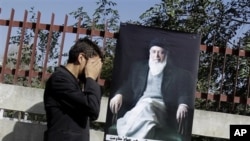A key Afghan insurgent leader says the United States has contacted his militant group to encourage it to abandon violence and join the Afghan government.
In an interview with the BBC published Monday, Haqqani network operational commander Siraj Haqqani says the United States is one of many nations whose intelligence agencies have asked the group to quit the Afghan insurgency. He dismissed the alleged contacts as an attempt to create tension within insurgent ranks. The Haqqani network is allied to the Taliban, Afghanistan's main insurgent group.
The BBC says Siraj Haqqani made the comments in an audio response to questions it delivered to him through an intermediary. The British broadcaster says it believes the audio is genuine. It says a face-to-face interview with the militant commander was not feasible because of security concerns.
In the interview, Haqqani denies accusations by Afghan officials that his network had a role in the September 20 assassination of Afghan peace envoy Burhanuddin Rabbani. A suicide bomber pretending to deliver a peace message from the Taliban killed the former Afghan president at his home in Kabul. Afghan authorities say the bomber was a Pakistani and the attack was planned in the Pakistani city of Quetta.
The former top U.S. military officer, Admiral Mike Mullen, said last month he believes the Haqqani network has been acting as a "veritable arm" of Pakistan's main intelligence agency, the ISI. He made the comment last month before retiring as U.S. Joint Chiefs of Staff chairman. Pakistan denies providing support to the militant group.
Siraj Haqqani told the BBC that his network had contacts with the intelligence agencies of Pakistan and other nations during the Soviet occupation of Afghanistan in the 1980s. But he said those nations have not maintained any contacts that could benefit the militant group since the 2001 U.S.-led invasion of Afghanistan.
Haqqani said accusations of ongoing links between the militant network and the ISI are aimed at "hiding the failure" of foreign intelligence services and "confusing" people.
Key Haqqani Leader: US Asked Us to Quit Violence, Join Afghan Govt












